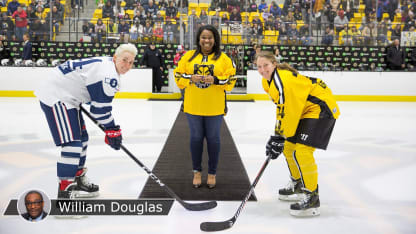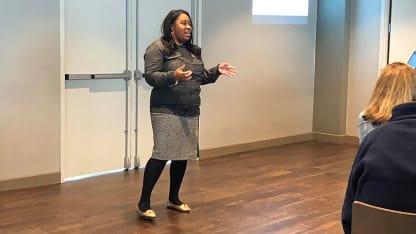William Douglas has been writing The Color of Hockey blog for the past eight years. Douglas joined NHL.com in March 2019 and writes about people of color in the game. Today, he profiles Stephanie Jackson, USA Hockey's first director of diversity and inclusion.
Color of Hockey: Jackson focused on long-term change
USA Hockey's first director of diversity increasing outreach to underserved communities

Stephanie Jackson sat with Darren Brown-Hall for three hours at a Buffalo-area restaurant reviewing how USA Hockey responded to the racist taunting that his son, Roshaun, endured during a Western New York youth hockey game in January 2019.
"She was asking us a lot of probing questions about what do we think would have been more helpful in getting resolution quicker," Brown-Hall said of the meeting last October. "It meant a lot just knowing that they're trying to do something, and she specifically, to prevent what my son had to go through from any other child having to go through that while they're trying to play a sport they love."
Jackson said her inaugural year as USA Hockey's first director of diversity and inclusion has been a listening tour of sorts, learning how the nation's hockey governing body works internally and how it's perceived beyond its Colorado Springs, Colorado, and Plymouth, Michigan, headquarters, particularly among underrepresented-but-growing hockey communities.
"Over this year my primary focus has just been working within USA Hockey to see where the needs are, where the gaps are, where the opportunities are," said Jackson, who joined the organization last June from Nike, where she worked in diversity and inclusion communications.
Pat Kelleher, executive director of USA Hockey, said he's impressed by what Jackson has brought to the organization as it tries to keep pace with the sport's increasing diversity.
"Stephanie has created a whole other network and brings back more information of what people are seeing and hearing and experiencing on the grass-roots levels," Kelleher said. "That's been very impactful for USA Hockey to understand that better."
Kim Davis, NHL executive vice president of social impact, growth and legislative affairs, and one of the highest-ranking black women in professional sports, said Jackson has been "a knowledgeable 'connector' who is working diligently within the youth hockey system to demonstrate why diversity and inclusion is relevant to everyone across the organization."
"Stephanie's steadfast efforts to encourage others to demonstrate the values of inclusion and respect in their day-to-day interactions will hopefully reveal over time how the youth hockey culture can shift in a meaningful and positive way," she said.

Jackson works out of USA Hockey's headquarters in Colorado Springs, but she has spent much of her time on the road meeting officials, volunteers and members of USA Hockey affiliates across the country and hosting events focusing on diversity and inclusion.
She listened and she learned.
"That outreach and engagement is important so that we know kind of how we're graded in the community," Jackson said. "I think one of the things about USA Hockey is we're special and we're unique, but a lot of times we can kind of be just in our own bubble and maybe sometimes we're not really doing the outreach in areas where we really, really, really need to know what those particular areas think about USA Hockey.
"So I've been able to do that, which is why I've been able to become privy to a lot of different things that are going on in the community," she said. "Then I share those things with our leadership so that we can learn from those things and figure out ways we can be better."
Having her ear to the ground enabled Jackson to learn that incidents involving racial slurs and other derogatory language were occurring more frequently than thought.
Her discovery indirectly influenced USA Hockey's decision in October to increase the penalty for using racial and derogatory slurs from a game misconduct to a match penalty, which carries a five-minute penalty and disqualification from the game in which it occurs.
"She helped bring some of these things to be more front-of-mind for us probably," Kelleher said in February. "Stephanie was helpful, for sure, to us in saying, 'Hey, these things are happening and more so than maybe get reported.'"
Jackson has introduced more diverse voices to USA Hockey and its affiliates. She invited Rico Phillips, founder of the Flint Inner-City Youth Hockey Program, to speak at an event titled "Strengthening Cultural Relationships and Significance in Our Communities" hosted by USA Hockey and Minnesota Hockey in January in Roseville, Minnesota.
"She was basically trying to find folks in the hockey world that were making a positive impact, specifically with diversity and inclusion," said Phillips, a retired firefighter who received the NHL's Willie O'Ree Community Hero Award last June. "There were a lot of discussions that she and I had, and we knew that we were on the same page with one another as far as we knew that we had go beyond the surface. We had to really get down to the grass-roots level of this to help make the change that some people only see on the surface."
Jackson said she's pleased with the direction USA Hockey is heading in terms of diversity and inclusion but adds that there is still more work to do to achieve a lasting change.
"I've been guilty of being impatient for wanting change in the hockey space too when I got the job," she said. "I've learned to be patient just so the change can last for a long time. It is difficult, especially when certain things are going on that are maybe not the best part of the hockey community and we want those things to change so quickly. But we do have to understand that there are lots of things that people have to learn before change happens, and that learning process only happens over time."

















